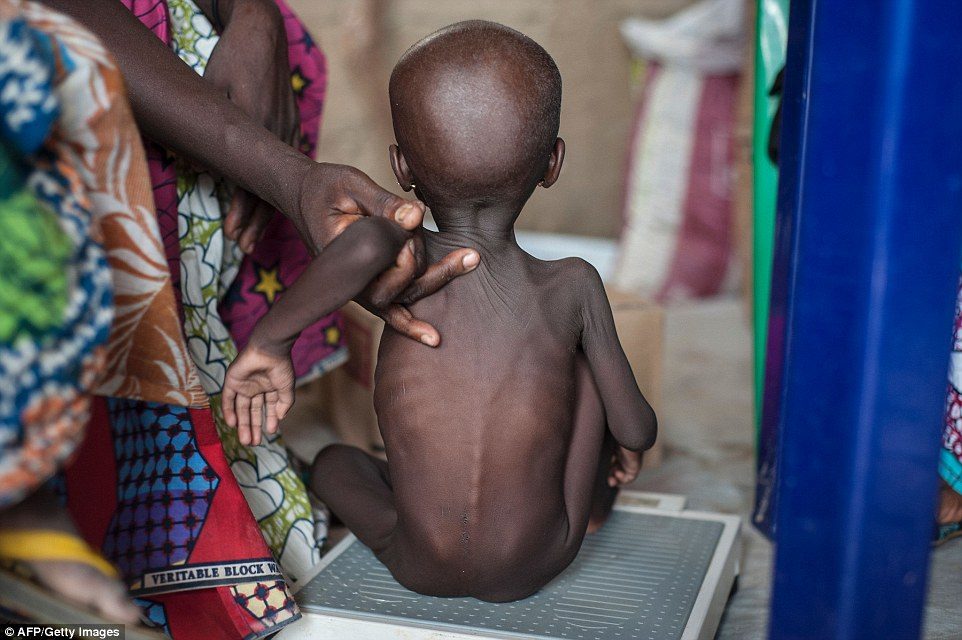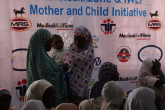
Do you know that for every child there is a critical 1,000-day period – from the moment the mother gets pregnant until the child’s second birthday? Every year, poor nutrition during this crucial time causes the death or disability of millions of children in low-income countries worldwide.
The United Nations has described malnutrition as the silent crisis in Nigeria. An estimated 2.4 million children are malnourished in Northern Nigeria alone, and 30 – 50% of all pregnant women are under-nourished.
Many children from poor families just don’t get enough food. Even when they have food, it’s not the right kind of food that allows them to grow healthy and strong. For many children, frequent illnesses such as diarrhea and worm infestation also add to the problem by causing loss of the nutrients they eat. Not eating well in the 1,000-day period creates a lot of disadvantages for a child.

Consequences of childhood under-nutrition in the 1,000-day period
Poor nutrition weakens the immune system, so undernourished children get sick more often with life-threatening infections.
The lack of proper food and nutrients in the 1000-day period causes a child to be smaller than he should be for his age. His brain and body do not grow well because he has not received adequate and nutritious food. This abnormal growth is called stunted growth or stunting. It is a permanent condition. A quarter of all undernourished children who survive through age five have stunted growth.
A stunted child’s brain is underdeveloped, with long-lasting damage:
- He or she has diminished mental capacity and the ability to learn
- They have poor school performance
- When stunted children become adults they are not strong enough – mentally or physically – to be productive, get good jobs and earn a livelihood
- They’re also more likely to have nutrition-related chronic diseases, such as hypertension, diabetes, and obesity later in life
Feeding a child the right kind of food after the age 2 can’t correct stunting or its effect on the child’s brain.

What causes malnutrition in the 1,000-day period?
Nearly 1000 children die in Nigeria every day from malnutrition-related causes. Together, malnutrition and under-nutrition contribute to almost half (about 45%) of all child deaths under age 5.
The problem starts long before pregnancy. A girl or woman who is not healthy and well nourished is more likely to have complications during pregnancy and childbirth. Her children are also more likely to be malnourished and stunted, impacting how well the children learn in school and their ability to earn a good living as adults. They grow up poor and in turn, can’t feed their children adequately creating a terrible cycle of poverty within families and entire communities.
Other challenges that contribute to malnutrition that women and children have little control over include:
- Illiteracy
- Poor access to safe and affordable nutritious food
- Low agricultural output as a result of declining economy
- Lack of awareness and understanding of healthy nutrition
- Poor hygiene and sanitation

Simple solutions
We can ensure that women survive and remain healthy during pregnancy and childbirth by helping women to be healthy before, during and after pregnancy. Strategies that work include:
- Health education & proper nutrition
- Antenatal care for every pregnant woman
- Providing iron and folic acid
- Making sure labor and childbirth are safe for mothers by giving skilled health care during delivery
A child’s risk of dying is highest in the first 28 days of life. However inadequate nutrition in the critical 1,000-day period has disastrous long-term consequences for newborns that survive.
We can prevent the problems of under-nutrition by some simple practices:
- Early and exclusive breastfeeding for the first six months of life helps children survive. It supports healthy brain development, improves learning ability with better educational achievement at age 5. Breastfeeding gives the baby the best possible start in life.
- Continue breastfeeding until age 2 but add complimentary food after the baby is six months old
- Use micronutrients and food fortifiers in children
- Fortify foods such as grain flours and cooking oil with vitamins and protein
- Give Vitamin A and zinc to all children 6 months – 5 years old
- Deworm children 12 months – 5 years every 6 months.
We can prevent childhood infection during the 1,000-day period through clean childbirth and clean umbilical cord care. Practicing good hygiene and regular hand washing is also a must when caring for babies and children. Encouraging childhood vaccinations and the use of Insecticide Treated Bednets further reduces the risk of infection.
Taking care to provide the right nutrition in the critical 1,000-day period from onset of pregnancy to a child’s 2nd birthday will produce a generation of healthy children who develop into productive adults who can shape the future of Africa.

